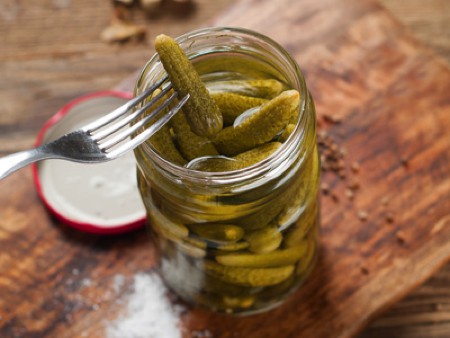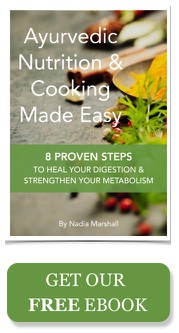By Nadia Marshall
In the recent episode of Catalyst called ‘Gut Reaction’ that was all about the relationship between high fibre diets, gut bacteria and good health, they showed the host downing shots of balsamic vinegar at a bar... as another way of reducing inflammation in the body.
It was explained that one of the reasons high fibre diets are so beneficial is because our gut bacteria break it down into short chain fatty acids (like acetate) and these SCFA then have a positive effect on the immune system, helping to reduce inflammatory responses... and, therefore, inflammatory diseases like asthma, inflammatory bowel disease, ulcerative colitis, heart disease, diabetes etc.
Vinegar’s main constituent is acetic acid or acetate... so consuming a little vinegar or vinegar-containing foods (like fermented and preserved foods) is believed to help reduce inflammation. Ayurveda would both agree and disagree with this... let me explain....
In Ayurveda, it is taught that vinegar and other fermented foods contain a predominance of the sour taste (often with a little salty taste too). The sour taste is composed of the EARTH and FIRE elements. The sour taste, in moderation, is said to improve appetite and digestion but here’s the thing.... if consumed IN EXCESS, it can contribute to heat conditions such as burning sensations and inflammation.
So, If you don’t have too much pitta in your constitution or you’re not suffering from a pitta aggravation then a little vinegar or fermented food with your meals will aid digestion and may indeed improve your immune system and reduce inflammation. However, if you have a pitta constitution, an insatiable appetite or any other signs of pitta-aggravation (and particularly if ama is present), then Ayurveda would suggest you avoid vinegar and fermented foods generally.
So what can you have instead to improve your gut bacteria and reduce inflammation, aside from fibre?
Ghee!
Yep, that’s right... ghee is composed of short chain fatty acids too. Instead of acetate, we’re talking butyrate (from the latin word for butter - butyrum). And butyric acid or butyrate has actually been found to be MORE effective at reducing inflammation than acetate (2).
But instead of being predominantly sour, ghee is predominantly sweet in taste which means it is composed of EARTH and WATER and will pacify Pitta (and Vata). Ghee also has the ‘prabhav’ or special quality of enkindling agni or enkindling the digestive fire. So it will also improve digestion and reduce inflammation.
In addition to producing acetate, our gut bacteria produce their own butyrate. The actual microbe that creates it is called Clostridium butyricum which has been used in Asia as a probiotic since the 1940s (3). Isn’t that cool... we have our very own tiny ghee-making factories in our guts! And the foods that increase our numbers of this little microbe are cream (another good reason to choose unhomogenised full cream milk) and yoghurt (best consumed as a lassi at lunchtime - check out our cooling rose lassi recipe in the WARMTH Cookbook).
So the moral of this little blog is not to say one thing is better than the other but rather to point out that when it comes to food medicine, there is no one prescription for everyone. If you have a Pitta constitution or imbalance, avoid over-doing the heating vinegar and try using a little cooling ghee instead.
Or, if you don’t know what that even means and it is all too confusing then keep it simple and stick with everything in moderation - a little vinegar on your salad, a little butter on your toast and a little ghee in your kicharee.
No shots of vinegar necessary!
Love
Nadia x
1) http://www.youtube.com/watch?v=w94D45txSxo
1) http://www.ncbi.nlm.nih.gov/pubmed/17569118
2) http://www.lifespa.com/superfood-making-microbe/
Good Gut Health: Vinegar vs Ghee




